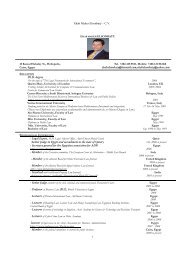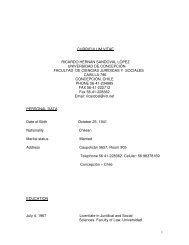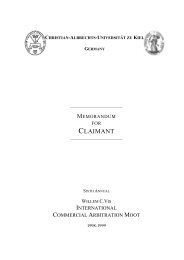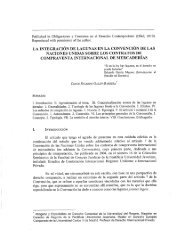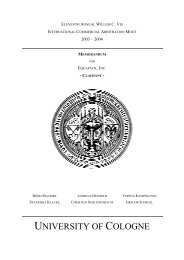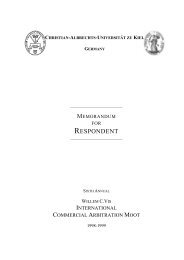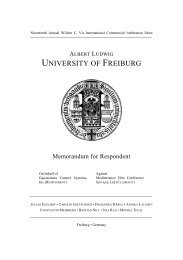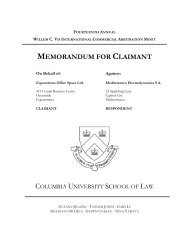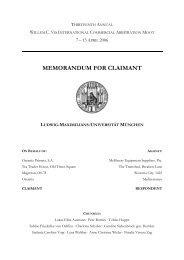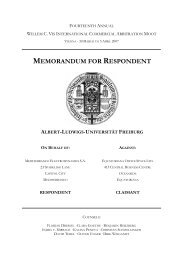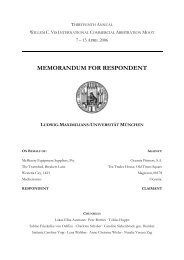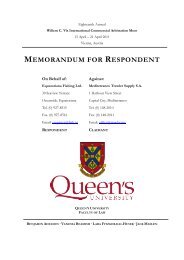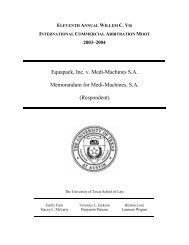MEMORANDUM FOR CLAIMANT
MEMORANDUM FOR CLAIMANT
MEMORANDUM FOR CLAIMANT
Create successful ePaper yourself
Turn your PDF publications into a flip-book with our unique Google optimized e-Paper software.
Rheinische Friedrich-Wilhelms-Universität Bonn<br />
46. Furthermore, interpretation of the choice of law clause pursuant to Art. 8 CISG shows that<br />
it cannot reasonably be understood as an exclusion of the CISG. The “commercial law” of<br />
Equatoriana covers various kinds of transactions [Procedural Order No. 2, Clarification<br />
No. 35; cf. Art. 1 Model Law, note 2: “the term ‘commercial’ should be given a wide<br />
interpretation so as to cover matters arising from all relationships of a commercial nature”].<br />
Accordingly, applying the standards for interpretation as set forth in Art. 8(2) CISG, one has<br />
to consider that a reasonable person would understand “commercial law of Equatoriana” in a<br />
very broad sense. This understanding of the term “commercial law” in Equatoriana is<br />
significant as well as the fact that the CISG is the part of the commercial law of Equatoriana<br />
governing international sale of goods [cf. para. 42]. Especially in the context of an<br />
international sale of goods contract, a reasonable person could only understand the reference<br />
to the “commercial law of Equatoriana” as including the CISG. Since the choice of law clause<br />
was not a negotiated term [Procedural Order No. 2, Clarification No. 30], there is no<br />
indication of a different understanding of the clause by either of the parties. Thus,<br />
interpretation according to Art. 8 CISG confirms that the choice of law clause does not<br />
amount to an implied exclusion of the CISG.<br />
47. Further supporting this conclusion, recent case law shows that strong requirements have to<br />
be met with respect to a clear indication in the choice of law clause that the parties intended to<br />
opt out of the CISG. In Assante Technologies, Inc. v. PMC-Sierra, Inc. [U.S.], the court held<br />
that even the choice of the law of one region of a Contracting State (“the laws of the State of<br />
California”) does not suffice to presume the exclusion of the CISG. It stated that in the<br />
absence of clear language indicating that both contracting parties intended to opt out of the<br />
CISG the contention that the choice of law of a Contracting State precludes the applicability<br />
of the CISG has to be rejected. This decision manifests the tendency to resolve any doubts in<br />
favor of the applicability of the CISG. This tendency corresponds to the ratio of Art. 6 CISG,<br />
which was intended to discourage exclusion of the CISG by implication [Secretariat<br />
Commentary, p. 44; Ziegel/Samson, Art. 6].<br />
48. Finally, one cannot draw a different conclusion from the fact that the law of Equatoriana<br />
(and thus the CISG) would have to be applied even without the choice of law clause. In<br />
practice, contracts often contain clauses of pure declaratory nature. Especially if there is a<br />
constellation that could give rise to doubts as to the applicable law, parties may wish to clarify<br />
which law applies. In the case at hand where buyer and seller have their places of business in<br />
18



